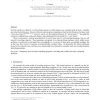Free Online Productivity Tools
i2Speak
i2Symbol
i2OCR
iTex2Img
iWeb2Print
iWeb2Shot
i2Type
iPdf2Split
iPdf2Merge
i2Bopomofo
i2Arabic
i2Style
i2Image
i2PDF
iLatex2Rtf
Sci2ools
101
Voted
DAM
1998
1998
Neither Reading Few Bits Twice Nor Reading Illegally Helps Much
We first consider so-called (1,+s)-branching programs in which along every consistent path at most s variables are tested more than once. We prove that any such program computing a characteristic function of a linear code C has size at least 2Ω(min{d1, d2/s}) , where d1 and d2 are the minimal distances of C and its dual C⊥ . We apply this criterion to explicit linear codes and obtain a super-polynomial lower bound for s = o(n/log n). Then we introduce a natural generalization of read-k-times and (1,+s)-branching programs that we call semantic branching programs. These programs correspond to corrupting Turing machines which, unlike eraser machines, are allowed to read input bits even illegally, i.e. in excess of their quota on multiple readings, but in that case they receive in response an unpredictably corrupted value. We generalize the above-mentioned bound to the semantic case, and also prove exponential lower bounds for semantic read-once nondeterministic branching programs. K...
| Added | 22 Dec 2010 |
| Updated | 22 Dec 2010 |
| Type | Journal |
| Year | 1998 |
| Where | DAM |
| Authors | Stasys Jukna, Alexander A. Razborov |
Comments (0)

